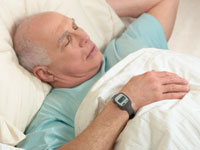Forty-five percent of the world's population suffers from some form of sleep disorder. Obstructive sleep apnea, the most common sleep disorder reported in Canada, affects three out of four adults above the age of 45.
According to new recommendations recently published by the American College of Physicians (ACP), individuals suffering from sleep apnea should not consider surgery, but rather two complimentary approaches: weight loss and treatment with continuous positive airway pressure (CPAP).
CPAP is a non-invasive therapy that works by providing a gentle flow of pressured air through the nose and or mouth using a mask. The positive air pressure prevents the airway from collapsing so the user can breathe freely during sleep.
The ACP recommendations state that CPAP more effectively raised the minimum oxygen saturation compared to other treatment options.
Sleep apnea affects approximately 860,000 Canadian adults, and is a known risk factor for a host of other conditions including heart attack, diabetes, high blood pressure and daytime drowsiness.
“There are three important steps to helping individuals with OSA: awareness, diagnosis and treatment. Each is integral to improving the sleep quality and overall health of individuals around the world,” said Dr. Lee-Chiong, chief medical liaison for Philips Home Healthcare Solutions.
Individuals affected by sleep apnea stop breathing repeatedly during sleep because of a blocked or collapsed airway, but are generally not aware of it. During these moments of paused breathing, which can last between 10 seconds to more than a minute, oxygen levels drop.
Obesity is known to raise the likelihood of having sleep apnea, but people of any weight can experience it.
If you think you or someone you know may suffer from as sleep disorder, take the online risk quiz http://worldsleepday.respironics.com/risk-test.html and talk to your doctor.
Read more here

No comments:
Post a Comment